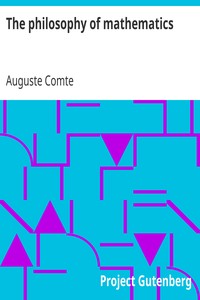The philosophy of mathematics by Auguste Comte
"The Philosophy of Mathematics" by Auguste Comte is a scientific publication written in the mid-19th century. The book delves into the fundamental aspects of mathematical science, analyzing its nature, scope, and methods. Through comprehensive examination, it aims to provide a deeper understanding of mathematics not merely as a collection of techniques but as a profound scientific discipline interconnected with various branches of knowledge. The opening of the book sets the stage for
Comte's exploration of mathematical philosophy by discussing the historical context and necessity of clearly defining the scope and divisions of mathematics. Comte argues that while mathematics is the most ancient and perfected of sciences, its true nature is often misunderstood due to vague definitions. He emphasizes the importance of indirect measurement in mathematics and outlines the methodological evolution that has allowed mathematicians to derive quantities from one another using established relationships. He anticipates a systematic classification of mathematical inquiries, which further frames the discussion for the chapters that will follow. This introduction establishes a philosophical foundation that Comte will build upon as he navigates complex ideas related to both abstract and concrete mathematics. (This is an automatically generated summary.)
Read or download for free
| Reading Options | Url | Size | |||
|---|---|---|---|---|---|
| Read now! | https://www.gutenberg.org/ebooks/39702.html.images | 490 kB | |||
| EPUB3 (E-readers incl. Send-to-Kindle) | https://www.gutenberg.org/ebooks/39702.epub3.images | 329 kB | |||
| EPUB (older E-readers) | https://www.gutenberg.org/ebooks/39702.epub.images | 331 kB | |||
| EPUB (no images, older E-readers) | https://www.gutenberg.org/ebooks/39702.epub.noimages | 222 kB | |||
| Kindle | https://www.gutenberg.org/ebooks/39702.kf8.images | 579 kB | |||
| older Kindles | https://www.gutenberg.org/ebooks/39702.kindle.images | 528 kB | |||
| Plain Text UTF-8 | https://www.gutenberg.org/ebooks/39702.txt.utf-8 | 438 kB | |||
| Download HTML (zip) | https://www.gutenberg.org/cache/epub/39702/pg39702-h.zip | 302 kB | |||
| There may be more files related to this item. | |||||
Similar Books
About this eBook
| Author | Comte, Auguste, 1798-1857 |
|---|---|
| Translator | Gillespie, W. M. (William Mitchell), 1816-1868 |
| LoC No. | 03004687 |
| Title | The philosophy of mathematics |
| Credits |
Produced by Anna Hall, Albert László and the Online Distributed Proofreading Team at www.pgdp.net (This file was produced from images generously made available by The Internet Archive) |
| Reading Level | Reading ease score: 24.8 (College graduate level). Very difficult to read. |
| Language | English |
| LoC Class | QA: Science: Mathematics |
| Subject | Mathematics -- Philosophy |
| Category | Text |
| EBook-No. | 39702 |
| Release Date | May 15, 2012 |
| Most Recently Updated | Sep 1, 2020 |
| Copyright Status | Public domain in the USA. |
| Downloads | 668 downloads in the last 30 days. |
| Project Gutenberg eBooks are always free! | |

